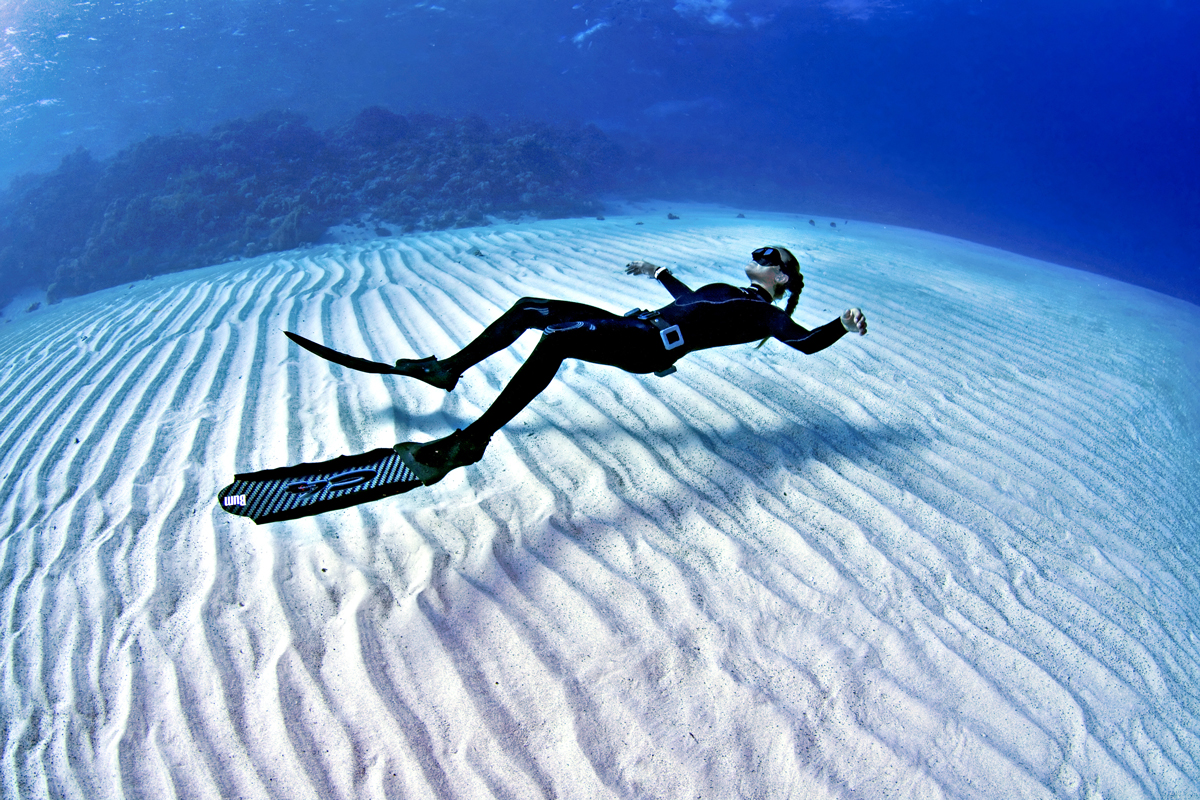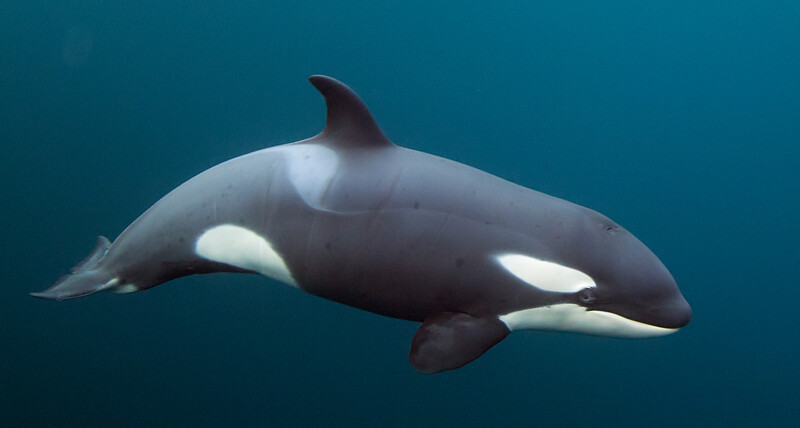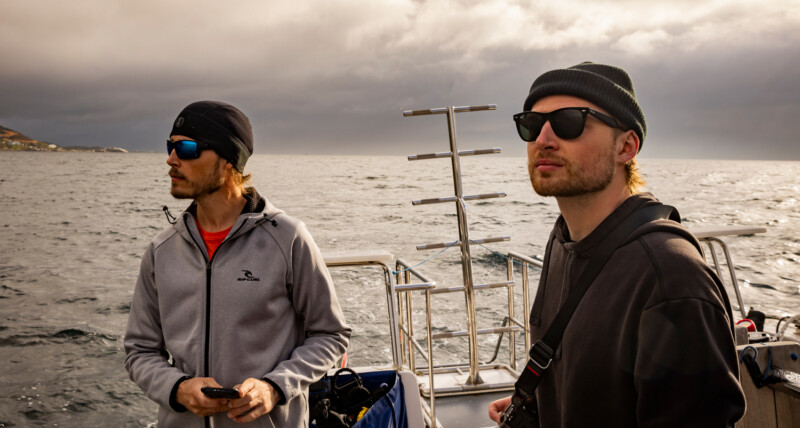Freediving - Get The Most From Your Next Dive Trip
What is Freediving?
The basic description of Freediving is a sport (or activity) whereby a person dives with only the last breath they take at the surface until resurfacing. This is done without the use of a breathing apparatus such as scuba gear.
When most people hear ‘freediving’, it conjures up images of people diving to extreme depths on a line. For many they remember the movie ‘The Big Blue‘ which took some hilarious creative liberties in portraying the sport!
Diving deep is only one part of breath hold diving (or freediving), but should not scare you off from pursuing it, as there is so much more to freediving than trying to push boundaries. Some people learn to freedive to help with their surfing or underwater photography, while others do it as a way to relax.
In fact, freediving courses can be a lot of fun and is designed to allow you to progress at a comfortable rate and where you should never feel like you are at the limit of your comfort level.
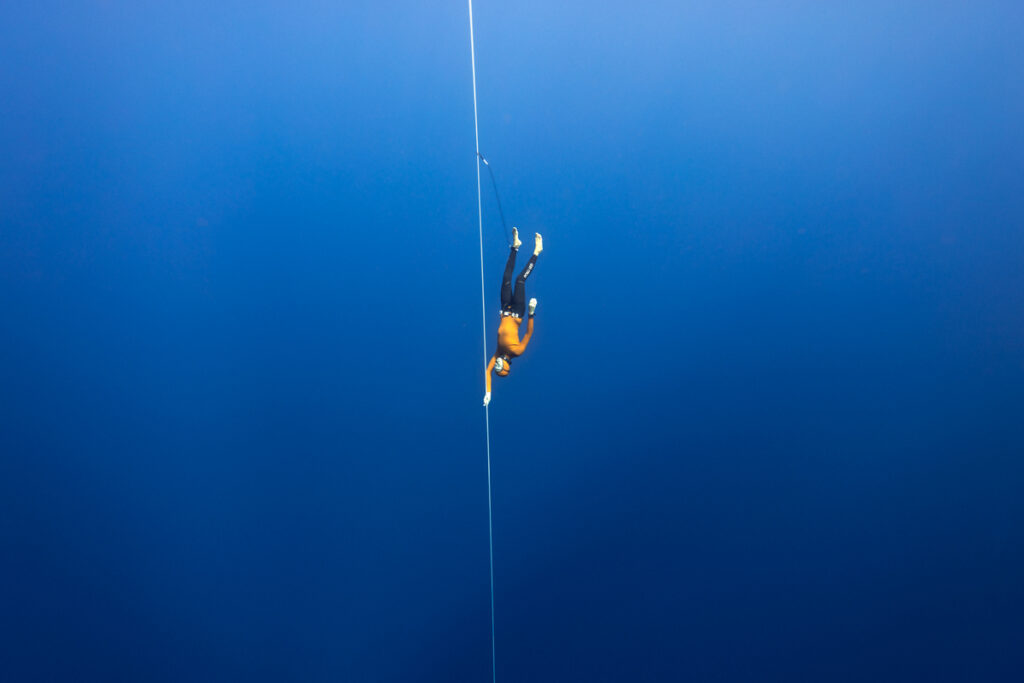
Why Do We Recommend A Freediving Course For Our Expeditions?
On our Arctic Freediving website (under the requirements section) one of the requirements is presented as;
“…clients will be currently certified as an open-water freediver (AIDA, SSI, FII Level 2 etc), OR alternatively have suitable experience at an advanced level as a snorkeler or scuba diver for these conditions. This means being able to operate in-water without any form of direct assistance while also being able to assist a ‘buddy’ if needed.”
Interesting side note – many people miss the OR and believe that they have to be a certified specifically as a freediver which is not quite the case. For example – a scuba diver or strong swimmer might in some instances be perfectly fine to join, should they meet all the requirements and are able to perform the basic skills listed (which you can find here).
For the majority of people these are very ‘doable’ and the average person (regardless of age or gender) can perform it all without too much effort, assuming that they have some in-water experience and that they are in moderately good psychical shape.
If you feel you might struggle after reading what will be expected of you, then we would definitely recommend joining a freediving course. This can be done anywhere in the world and takes as little as two days to complete (more information on this further down).

During the in-water portion of the shore day on our Arctic Freediving weeks, we also give tips and teach techniques on how to behave in the water. This is done so that all our guests are on the same page and work well together to ensure safe, ethical and awesome encounters.
After we have covered some basics and actually practiced it in the water, it should be possible to pair (or buddy) with any of the other guests regardless if they are freedivers, scuba divers, military personnel, or an IT tech who grew up snorkeling.
But then why do we put so much emphasis on freediving?

The short answer is that a freediving course gives the basic skills required and helps develop technique which will ensure you get the most from your time in the water on a expedition like this. At the same it also provides you with the skills to assist your buddy if needed.
The longer answer…
A basic freediving course (like the ones listed in the requirement above) is much more than just learning how to hold your breath. In addition to many other topics, these courses also teach you;
- proper breathing and relaxation techniques
- efficient finning techniques
- safely diving within your limits
- basic environmental awareness
- how to assist your buddy in the event of an emergency (and how to spot signs of trouble)
- how to setup and use your equipment
- How to keep developing your ability
Not only do you learn the theory, but you actually get to practice these things in order to become proficient.
Getting The Most From The Experience
With just these skills, you will already benefit immensely from any in-water experience, even if it does not require much diving (for example a snorkeling trip in the Red Sea).
With regards to in-water wildlife expeditions like ours, one of the biggest misconceptions a person might have is that they will be taken to a predetermined spot, comfortably dropped in the water and that everything happens around them in perfect conditions until they have had enough. This might occasionally happen, but it is definitely not likely.
For the expeditions we are known for, there is usually a bit of ‘work’ involved so being prepared is crucial (more on that below).
Imagine wearing the correct equipment (which you are familiar with) and sliding into the water with a buddy to approach a relaxed pod of orcas who are a little distance away from the boat. Now imagine being able to efficiently and comfortably approach them at the surface while you both use the least amount of effort and without making any noise which could potentially disturb these orcas. As you reach them you are still relaxed enough to immediately take a breath and dive down for 15 to 20 seconds as the pod comes in for a closer look.
It might not sound like a long time, but 15 seconds might be just the time you need to see and pod of orcas passing at eye level instead of looking down on their backs from the surface…
It is Not Just You...
Using the same example, lets say you read this article, did a freediving course, have the right suit and equipment but decided to join another operator who does not have these requirements…
So now you are in a boat with 11 other people (instead of 3 others) and 6 of them do not have any diving experience and they are all wearing drysuits provided by the operator (a whole different article….).
As the guide on the boat tells you to enter the water you and 11 other people get off the boat and all you hear is the sound of splashing and chaos as people fall into the water. You immediately try to move towards the pod to get away from the noise, but at least 4 of the other guests are scuba divers, so they ‘sort of’ manage to keep up with you, but they have such poor technique and with the drysuits (which most of them have never used), every kick they make sounds like an explosion on the surface.
Before you even reach the orcas you see the whole pod turning away from you, picking up speed and diving deeper….
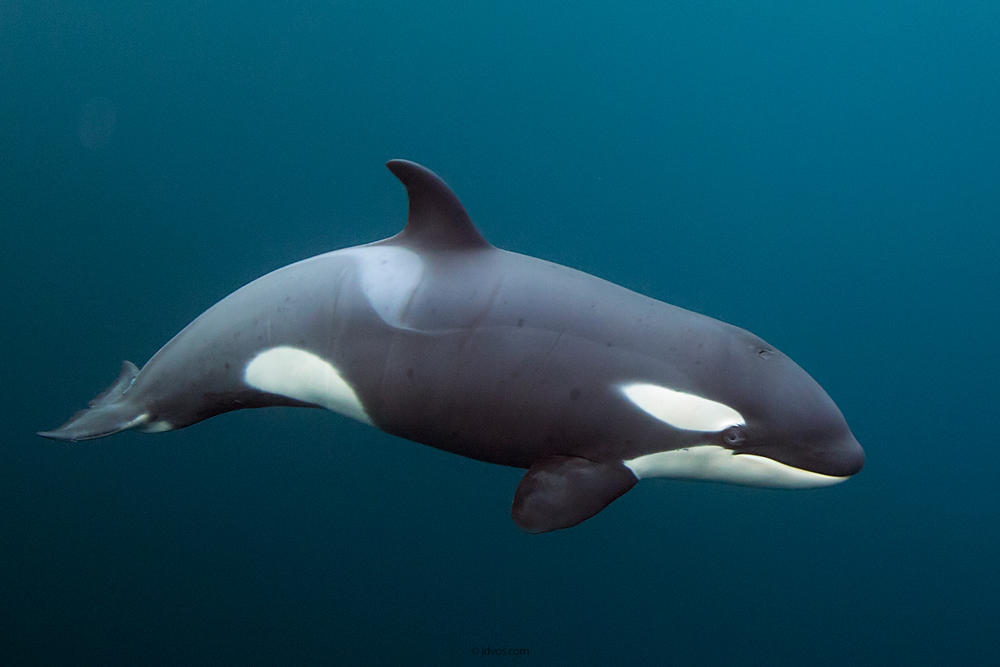
But wait – not all hope is lost as you see the boat come around to pick everyone up to try again….except it is taking forever because at least 3 of the guests require a lot of help from the driver to get back on the boat. By the time you are finally all back in the boat, the pod is almost gone.
The operator realises no one is seeing anything, so now aims to drop guests right on top of the animals. The boat starts to drive over the pod and cuts off their direction of travel to get clients (some who can barely swim) in the water as close as possible and all you can do is watch.
This ‘story’ is not an exaggeration and it is sadly what many people experience in one way or another on trips with no requirements for their guests.
This is another reason why we require all our guests to meet our standards as it ensures that experiences like the one described here does not happen.
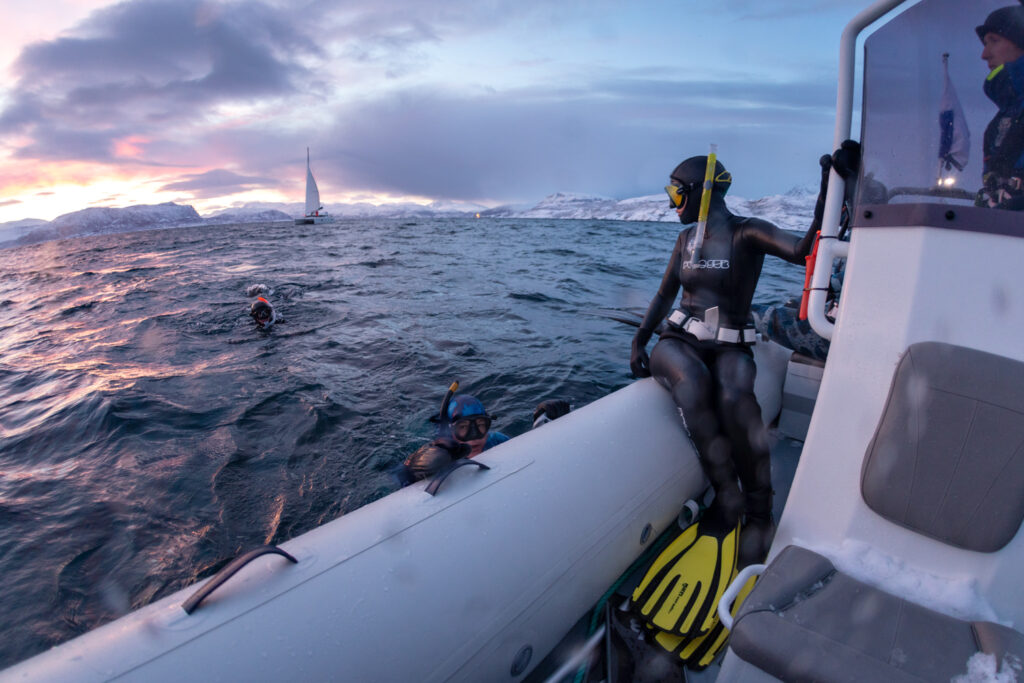
Your Behaviour Influences Ethical Encounters
Another very important aspect of being confident and efficient in the water is how you respond to the wildlife you might encounter. This means being able to move out of an area or to avoid placing yourself in a situation which might put the animals or yourself in a bad situation.
Apart from a safety point of view, this sometimes comes down to not interfering with the natural behaviour of the animals and the best way to explain this is by using an example which applies in both South Africa and Norway;
For both the Sardine Run and our orca / humpback expeditions we often encounter large baitballs which are being kept together and fed on by the animals in either location (orcas, whales, sharks and dolphins) – also known as carousel feeding.
Something we stress time and time again is that you should be a ‘fly on the wall‘ in these situations where you are only observing what is happening, but not interfering.
A baitball situation like this can be very dynamic and exciting with a lot of movement and sudden changes. Our clients are all properly briefed on how to handle these situations, but a key part of it is staying outside the baitball with a bit of seperation. This means sometimes having to swim quickly to get out of the way if the fish surge towards you, or in other instances getting from where you are to the boat (where the boat might not be able to approach you in order to avoid disturbing the animals). If you look closely at the video above you will notice a lot of swimming backward and moving away from the main ball of fish by myself and a client..
If you are not comfortable swimming and can not do this efficiently then you immediately become a liability and by simply being unable to move out of the center of schooling fish (also unsafe!), you can disrupt the entire baitball by breaking it up or causing the animals feeding on it to avoid you. In extreme cases this can even cause the dolphins, orcas, sharks or birds to abandon the feeding completely (and yes, it takes as little as one person on the surface!)
In this instance, you literally take food out of the mouths of these animals after they spent a significant amount of energy and time building up the opportunity. This is of course unacceptable and unethical and another simple reason why we have these standards for all our guests.
Trust
At this point it is probably worth mentioning that I am a Freediving Instructor Trainer, a Scuba Instructor, as well as a Commercial Diver with almost 20 years of diving and teaching experience in a wide variety of conditions in oceans and water bodies all over the world. It is safe to say that my opinion is not biased and is based on a lot of experience.
The reality is that bad things can happen to anyone at any time and sometimes, unfortunately they do. It might be a small cramp (even this can escalate) or it could be an unforeseen event with much heavier consequences.
Whether I am a guide or a guest, at no point should I feel like I need to constantly watch and be concerned about someone because they are not confident in the water. This also means they will be even less useful if someone else actually needs their help.
Quite simply – It does not matter if you are snorkelling in shallow water or scuba diving on a wreck – a person who essentially needs to have their hand held is a risk to themselves and anyone else with them.
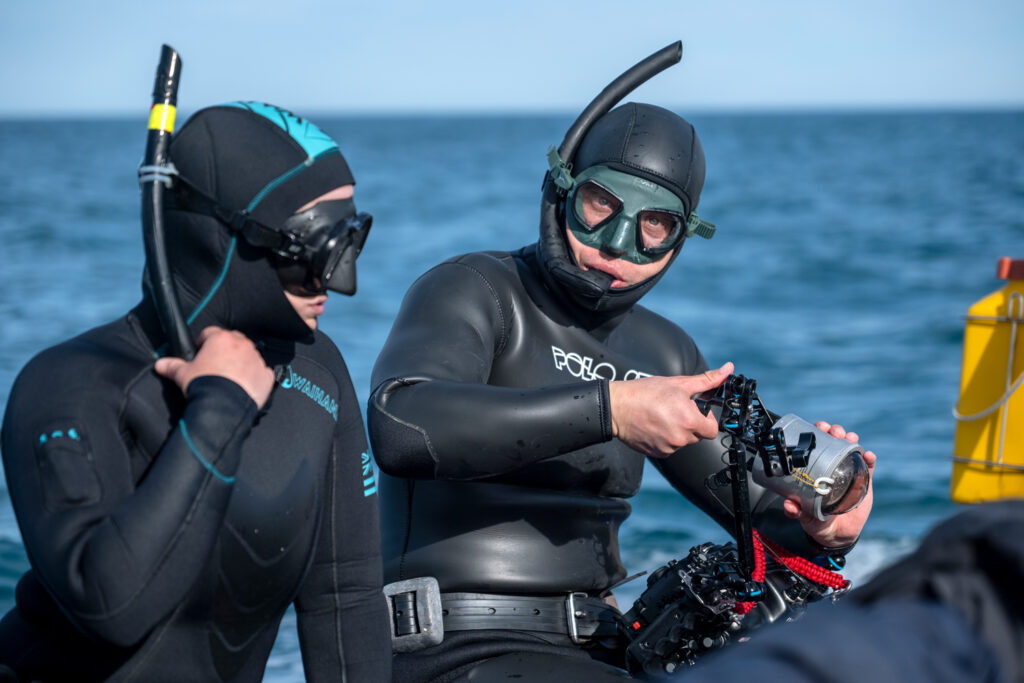
When I enter the water with someone (clients included), I need to know that I can trust them. Not just with how comfortable they are in the water, but also in their ability to assist me if needed (or anyone else in the water with them), regardless of how experienced or inexperienced any one of us might be.
Whether it is in South Africa, Egypt or Norway, during the expeditions we run, there are a lot of possible variables when entering the water including (but not limited to):
- the wildlife we encounter
- the sea state (swell, visibility etc)
- possible currents
- wind
- air temperature
- snow/rain/hail (yes it happens)
- fatigue
- unexpected obstacles in the water (ghost nets, lines etc)
- possible boat traffic
and more
When someone completes a freediving course with a reputable agency, I can confidently say that their basic in-water skill level is already a bit higher than the average open water scuba diver and signicanlty higher than someone with no diving experience.
This means that even a new freediver should (in theory) be self sufficient in the water and have at least the basic skills needed to assist someone, or to get them to help if needed.
At the same time they should also have a basic level of self awareness to know what their limits are.
SCUBA Compared To Freediving
So we keep mentioning that some of our guests are scuba divers and not freedivers – what does it matter and what is the difference for our expeditions?
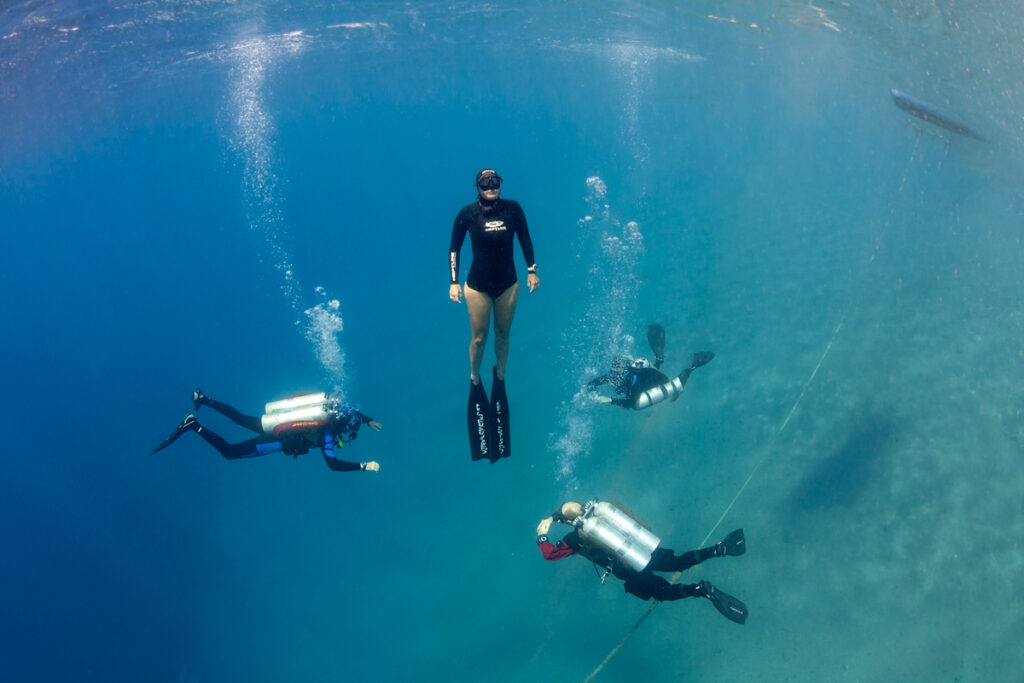
First off – scuba diving is awesome and has its uses.
That being said (some scuba divers might be rolling their eyes at this next point), the reality is that at a beginner scuba diving level, you do not really have to be very efficient in the water to get around. For this reason very little emphasis is placed at an ‘Open Water’ or even ‘Advanced’ scuba diving level on efficient finning technique, or getting from point A to B quickly – something which is very important for what we do.
This is part of why we have the in-water check during the shore day, where we can give some basic additional pointers related to technique, approaches and safety and to have everyone practice things like proper (efficient, no noise) finning in the water before heading out for the real thing. Usually our scuba diving guests need a bit of ‘fine tuning’ with their swimming / finning, although they usually do just fine halfway into the trip.
Quick tip – A freediving course will make you a better scuba diver, but a scuba course will not make you a better freediver
At the end of the day, even an open water scuba diver should have some in-water training/experience before they arrive, as well as some of the basic skills related to responding to a basic emergency or to get help if needed.
Freediving - A Skill For Life
The great thing about freediving is that once you have done the course (which takes as little as 2 to 3 days) you will have a new skill set that allows you to enjoy the ocean (or lakes and rivers) anywhere in the world on your next vacation.
All you need is a mask, snorkel and fins and with a bit of practice you can even start to enjoy things like snorkeling or training in a Cenote, or using ‘toys’ like underwater scooters – check out the video below of Linda Paganelli and myself having fun with them;
The options for in-water experiences are truly endless with freediving and many people even discover the competitive world of the sport after having started purely for recreation.
Where Can I Learn To Freedive?
If you decide you want to try freediving (even if you never join a single expedition with us), it is important to find a reputable instructor, dive center or agency to help you discover this amazing sport.
With freediving still being one of the fastest growing water sports in the world, it has become increasingly easy to find a course.
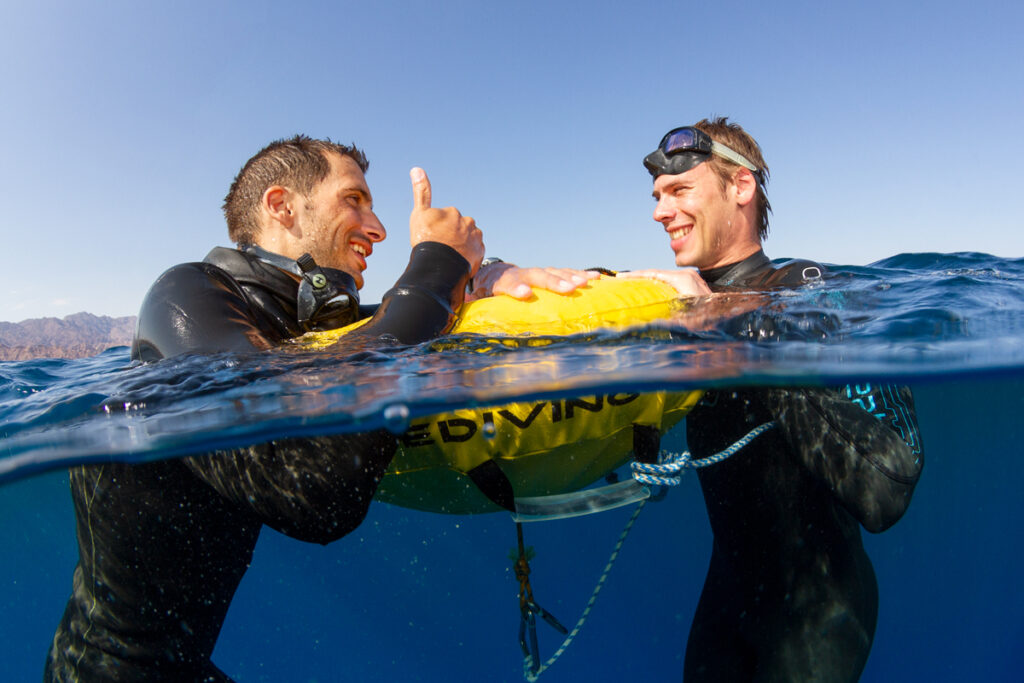
Reputable agencies include SSI, AIDA, CMAS and FII and availibity will depend on where you are. For example FII is popular in the US but not as easily found in the EU. There are many more, including newer ones like Molchanovs, but we recommend starting your search with SSI, AIDA or FII. The scuba agency PADI is another option offering freediving courses, although based on past experience I would recommend aiming to complete a PADI freediving course at least one level higher than the equivalent SSI or AIDA course to ensure you are at the same level. For example; SSI level 1 = the ‘PADI Freediver‘ not the “PADI Basic Freediver‘,
An important note – an agency like SSI or PADI requires instructors to be affiliated with a dive center. This ensures a direct monitoring system, so the quality of coursers should be consistent and it is nearly impossible to cut corners.
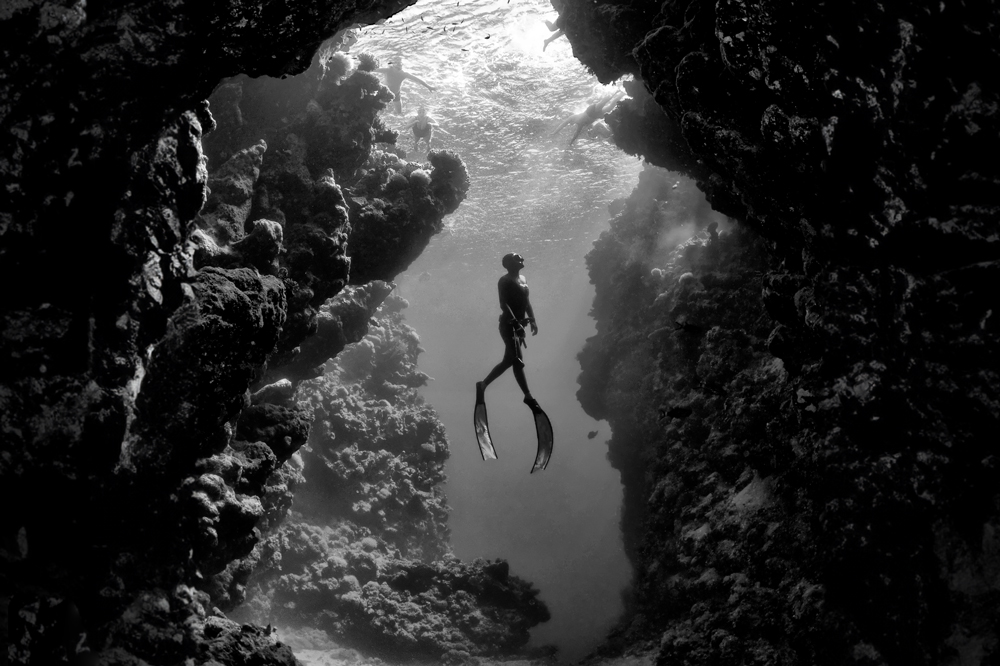
Agencies like (for example) AIDA and Molchanovs allow instructors to teach independently from anywhere (sometimes quite literally out of a car) with little to no direct monitoring. So depending on who your instructor is, this means the quality of your course can be amazing or (to put it plainly) nothing more than a cash grab to teach you only a fraction of what is required.
This does not mean that AIDA or Molchanovs is ‘bad’, but the take away is that its worth reading some reviews or finding out from other students what they thought of their instructor before signing up.
As for where to find courses near you;
SSI has a search function to help you find a dive center and you can find this here
AIDA has an instructor search function – see it here
FII also has a ‘find a course’ function here
Can I Do A Freediving Course With Oceans Around Us?
Our partners at Atlantis Freediving in Tenerife will be happy to help and offer a wide variety of options throughout the year for all skills levels. The center is an award winning SSI freediving center and offers everything from single courses to full training weeks and packages. There is even a large, fully intact wreck of a tugboat right in front of the center for divers of all levels to explore.
You can find out more here:
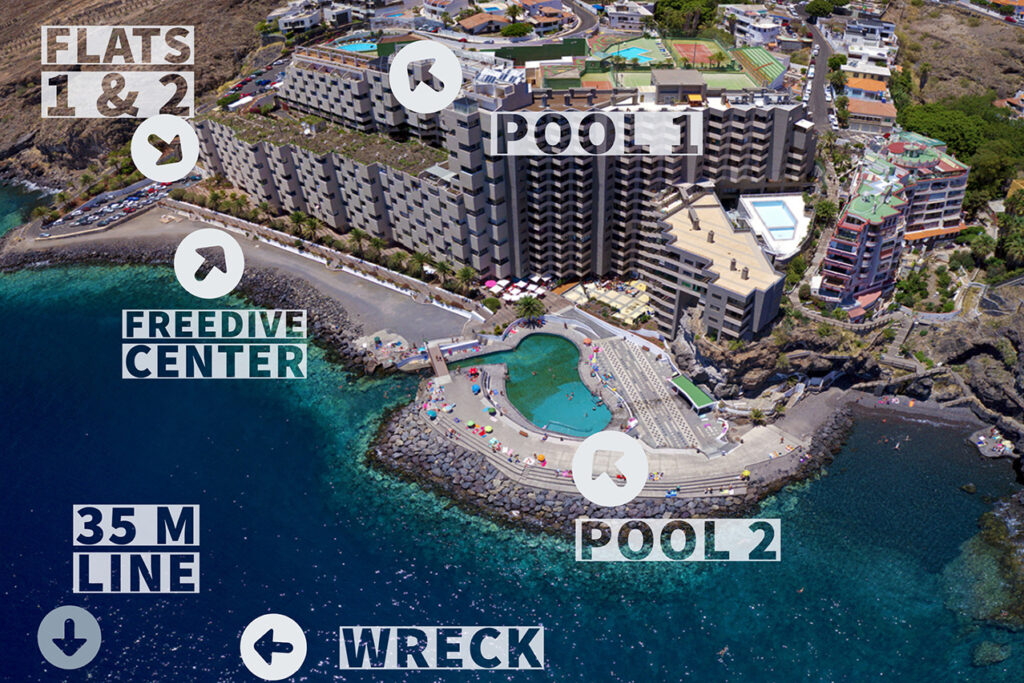
The center has great instructors and facilities and was founded (and is also co-owned) by the legendary vice world champion freediver Linda Paganelli.
Linda has trained and dived with the top freedivers in the world, including everyone from Herbert Nitsch and Alexey Molchanov to current multiple world record holder Alenka Artnik. You can rest assured it is a great place to start or progress and you might even meet some of us there.
It also does not hurt that it is on a great island with lots to do!
Do It Safe And Responsibly
The most important rule in freediving is;
NEVER FREEDIVE ALONE
It does not matter if you are ‘only diving shallow’ or if you think you know the area – always go with a buddy who is properly trained and always dive within the limits of the less experienced of the two (or more) of you.
Then;
DO NOT TRY TO TEACH YOURSELF
As a freediving instructor I can share countless stories of people who paid the ultimate price because they did not freedive safely for the simple reason that they did not know how to (even though they believed they did).
With the YouTube era it might be tempting to try and ‘teach yourself’ by watching videos telling you what to do. I can not stress how irresponsible this is (another whole different article…).
The Bottom Line
Freediving has many benefits including some not discussed here (physical and mental health as well), but the takeaway from this article is;
Completing a freediving course will enhance your next in-water adventures, make it more enjoyable and rewarding, all while doing so safely and ethically.
Author – Jacques de Vos

